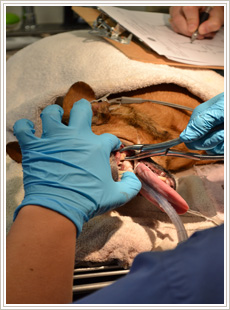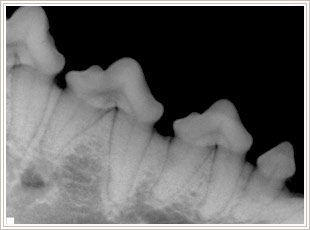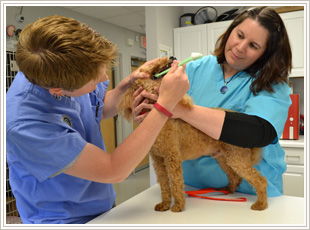Pet Dental Care
 Did you know that you can add two to four years to your pet’s life with proper dental care?
Did you know that you can add two to four years to your pet’s life with proper dental care?
Dental hygiene is an important part of your pet’s preventative health care plan. If left untreated, dental problems can lead to larger systemic issues in your pet due to oral bacteria entering the bloodstream and damaging the kidneys, heart, and liver.
Unfortunately, dental disease is often overlooked by many pet owners who believe their pet’s diet alone is enough to protect their pet. This isn’t the case as it is estimated that more than 80 percent of dogs and 70 percent of cats develop tooth and gum disease by the age of three years.
Dental disease and its serious consequences can be avoided by bringing your pet to your veterinarian for regular dental check-ups and teeth cleanings.
Community Animal Hospital’s dental services include ultrasonic scaling and polishing, tooth extractions, and oral surgery.
 We also are able to offer our clients computerized dental radiographs. These high-definition images provide a view below your pet’s gum line and jaw, in order to look for evidence of dental disease that cannot be seen by visual examination alone.
We also are able to offer our clients computerized dental radiographs. These high-definition images provide a view below your pet’s gum line and jaw, in order to look for evidence of dental disease that cannot be seen by visual examination alone.
This is a wonderful tool for enabling the treatment of dental issues before they become much larger and more expensive medical concerns.
Home Dental Care

Dental care does not end with a visit to your veterinarian. You need to continue your veterinarian’s good work at home by brushing your pet’s teeth as part of a home dental care regimen. We also have several products to help you with your home dental care.
Additionally, any member of our staff can show you the proper method of brushing your pet’s teeth as well as help you select from our wide range of dental products.
It is also important for you to be able to recognize the signs and symptoms of dental problems, which include:
-Bad breath
-A yellowish-brown crust of plaque on the teeth near the gum line
-Red and swollen gums
-Pain or bleeding when your pet eats or when the mouth or gums are touched
-Decreased appetite or difficulty eating
-Loose or missing teeth





